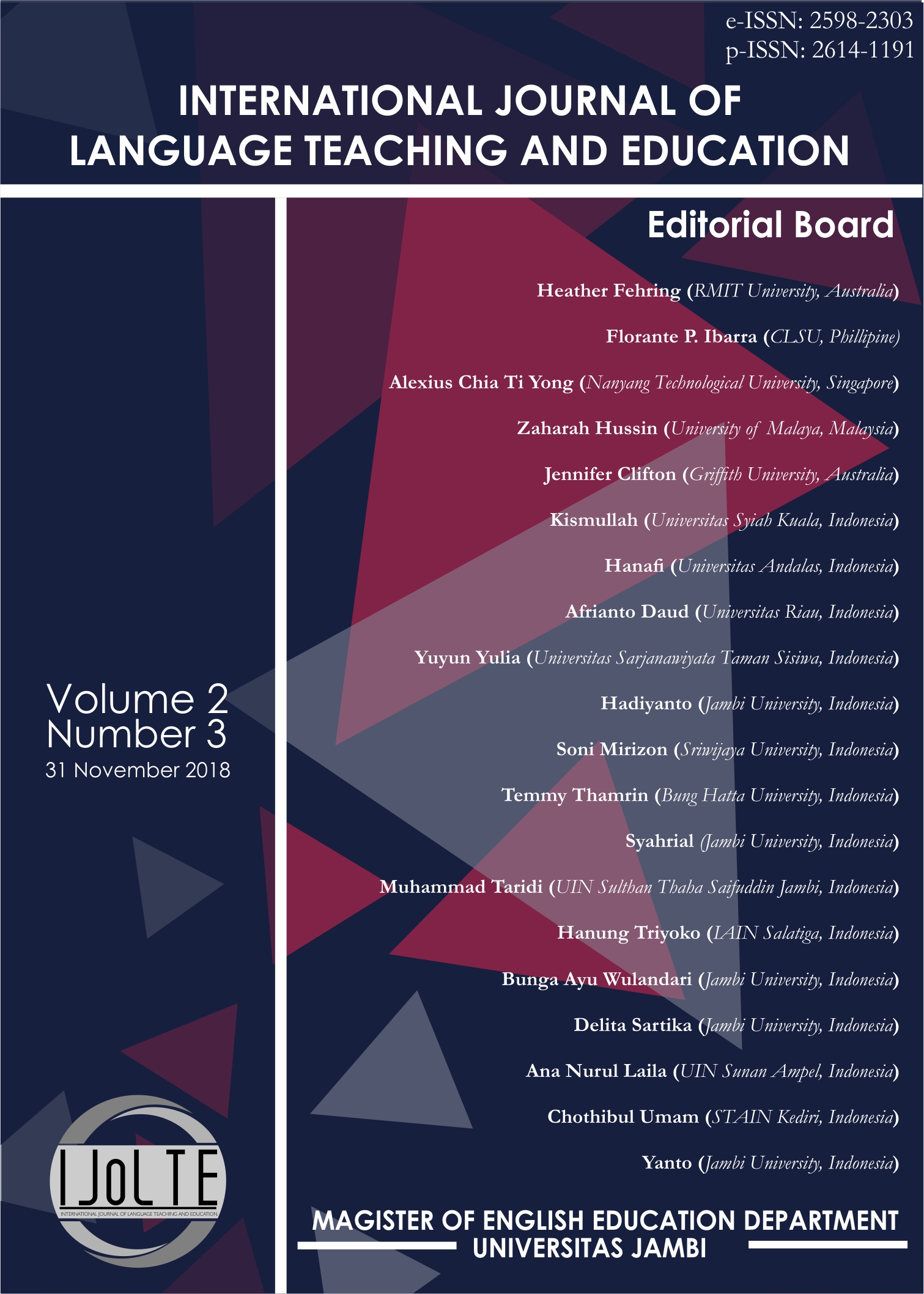The Picture Word Inductive Model: Its Effectiveness to Teach Writing Viewed from Students' Interest
DOI:
https://doi.org/10.22437/ijolte.v2i3.5697Abstract
Picture Word Inductive Model is an inquiry-oriented strategy for teaching writing that uses picture containing familiar objects to fully lead students into inquiring about words, adding words to their writing, and ultimately developing the title, sentences, and paragraphs about their picture. This experimental study aimed to find out the effectiveness of PWIM to teach writing viewed from students’ interest in the eighth grade of MTs. ASWAJA Pontianak. Sampling technique was through cluster random sampling resulting 2 classes which consist of 26 students of each class contributed to the study. Technique of data collection encompassed writing test and questionnaire. The data were analyzed by using 2x2 Multifactor Analysis of Variance (ANOVA) and Tukey’s HSD Test. The result revealed that: (1) Picture Word Inductive Model(PWIM) is more effective than Controlled-Writing Strategy (CWS) to teach writing; (2) students having high interest have better writing skill than those having low interest. (3) there is an interaction between teaching strategies and the level of interest on students’ writing skill.
Downloads
Downloads
Published
Versions
- 2018-12-01 (1)
- 2018-12-01 (1)
How to Cite
Issue
Section
License
The Authors submitting a manuscript do so on the understanding that if accepted for publication, copyright of the article shall be assigned to International Journal of Language Teaching and Education (IJoLTe) and Magister Program of English Education Department, Universitas Jambi as publisher of the journal. Copyright encompasses rights to reproduce and deliver the article in all form and media, including reprints, photographs, microfilms, and any other similar reproductions, as well as translations.
IJoLTe keep the rights to articles that have been published. And, the authors are permitted to disseminate published article by sharing the link of IJoLTe' website. Authors are allowed to use their works for any purposes deemed necessary without written permission from IJoLTe with an acknowledgement of initial publication in this journal.
IJoLTe and Magister Program of English Education Department, Universitas Jambi, and the Editors make every effort to ensure that no wrong or misleading data, opinions or statements be published in the journal. In any way, the contents of the articles and advertisements published in IJoLTe are the sole and responsibility of their respective authors and advertisers.
If the article was jointly prepared by more than one author, any authors who submitting the manuscript warrants that he/she has been authorized by all co-authors to be agreed on this copyright and license notice (agreement) on their behalf, and agrees to inform his/her co-authors of the terms of this policy. IJoLTe will not be held liable for anything that may arise due to the author(s) internal dispute. IJoLTe will only communicate with the corresponding author.
By submitting the article/manuscript to this journal, the authors agree with this policy and consciously agree that IJoLTe does not provide royalties or other fees to the authors for their published articles. By agreeing this policy, IJoLTe ensures that published articles are publicly accessible and will be free of charge for the readers. No specific document sign-off is required.
Users of this website will be licensed to use materials from this website following the Creative Commons Attribution 4.0 International License. Please use the materials accordingly
You are free to:
- Share — copy and redistribute the material in any medium or format
- Adapt — remix, transform, and build upon the material for any purpose, even commercially.
- The licensor cannot revoke these freedoms as long as you follow the license terms.





